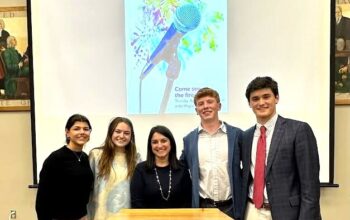Alessandra Gass, Editor-in-Chief
@agasscourant
Throughout high school, students spend time exploring various opportunities provided to them and developing niche interests with the intention of specializing in the future. While some find a passion for analyzing world history or an inclination towards multivariable calculus, others thrive in artistic environments. When college application time comes around, artistically-inclined students ask themselves an essential question: should I pursue this passion professionally or explore an academic field?
For junior Nick Mohamad, pursuing musical theater after high school has been on his horizons since middle school. “I was encouraged to join theater by my friends in the sixth grade as a hobby,” said Nick. “But, I very quickly realized how much I loved performing and the community that comes with musical theater, leading to my passion for performance and a drive to pursue it as a career.”
Nick will obtain this goal through enrollment at a university arts program. “I plan to receive my Bachelor of Fine Arts in Musical Theater at a university, which would further enhance my acting, singing and dancing skills, as well as business management and other academic areas since I’ll receive a traditional higher education simultaneously,” he said. “I’d then like to pursue a Master’s in Fine Arts in Film Production, which will train me to produce and direct any type of film. All these goals rely on me attending a traditional college-based arts program.”
While senior Maddie Iulo has been training in ballet for the past 15 years, she developed an interest in musical theater in high school. “I have been a dancer since I was a little kid, but truly fell in love with ballet when I was nine and began taking my training very seriously,” said Maddie. “When I was 14, I started experimenting with other styles of dance outside of ballet and became obsessed with theater jazz. I started training in various styles of dance regularly and began taking vocal lessons, while maintaining the same full-time ballet training schedule.”
The application and acceptance to BFA programs at a university is rigorous. “Depending on the school, there are different audition processes,” said Maddie. “While some only have in-person auditions that are six to seven hours long, others require pre-screens where you have to send videos of yourself learning their combinations or doing a personal solo to be approved to audition in at all. In both cases, there are several dance-related supplemental essays you must send in, as well as a dance resume, headshot and action shots.”
In contrast to Nick planning to attend a traditional university, Maddie has explored the possibility of attending a conservatory. “Because of how specific my interests are, I don’t fit into the box of most Musical Theater BFA programs because I’m mostly a dancer, and while I do have the background to be accepted to a dance BFA program, the conservatories I am applying to tend to lean towards a dancers first group,” said Maddie. “This means that I would be able to focus on my dance training while getting vocal and acting lessons as well.”
Conservatories allow specialization of a specific artistic ability rather than the combination of academics and art at a typical university. “There is no label on a major or degree at a conservatory, allowing more flexibility. They are often two year long post-college programs, similar to an associates degree,” said Maddie. “They don’t have any academic classes, and are usually much more full-time than a college schedule would be. However, the application process is very similar to a college, most requesting an academic transcript and multiple teacher recommendations.”
Alumni Larson Riccoboni turned her passion for photography into a successful business post-high school. “My love of photography started simply as a hobby – and I was actually approached by someone who had seen me taking photos at a local park. They asked if I could take their family photos, and that was really the start of my photography on a professional level,” said Larson. “With each shoot that followed I gained more experience, and I used tutorials and videos online to improve my skill. Now I cater my photo sessions to families, couples, and kids/teens of all ages for a variety of occasions.”
Larson chose to take time off after high school to pursue photography and further her professional abilities. “Taking time off after high school has been a wonderful decision for me personally,” said Larson. “Using that time to pursue a passion can help you to see what kind of job, schedule, and environment you succeed in. The extra bit of time to find out what makes you the happiest now can result in a more productive outcome in the long-term – even if it means waiting to commit to higher education or college.”
Though pressure to commit to higher-level education is significant, Larson is grateful for the time she took off. “I’m glad I waited, because at the time of graduating, I had no idea what field would be right for me. Now that I am further removed from the stressful environment surrounding college decisions, I have more clarity with what I’d like to do with my career going forward,” she said. “There is a lot of pressure to make those decisions prematurely, and if you’re feeling unsure, that doesn’t make you a bad student or ill equipped. There are many ways to learn outside of a classroom environment, and those skills will help you make your way back to furthering your education in a productive way.”
Filmmaking teacher Jennifer Sinski has helped students decide what type of degree they’d like to pursue in order to fulfill their passion. “Students can create short films independently, finding work in their community as people are always seeking out videographers, enroll in a film school or college program, or begin interning, working and applying to positions to get a foot in the door.” she said.
However, taking a love for film to the next level does not come without difficulties. “Now more than ever, the world is looking for young people who are willing to learn, create and take creative risks in the field of film, video and animation,” said Ms. Sinski. “However, students that want to take their passion to the next level need to be ready for the hardships that can stand in their way, and they should try to immerse themselves in the new and constantly-changing software and not be afraid to pursue an idea; creative risk-taking is where the most ambitious projects all begin.”
While the process is draining, the outcome is rewarding to devoted artists. “I love being on stage, and I don’t feel fulfilled when I’m not dancing,” said Maddie. “I know that I am meant to perform and will do just about anything to accomplish my dreams.”




